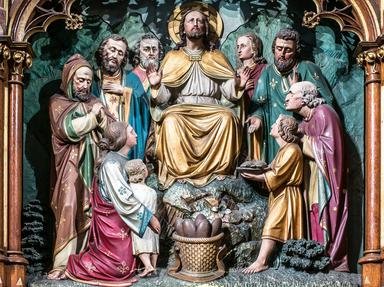Quiz Answer Key and Fun Facts
1. First Commandment: "Thou shalt have no other gods before Me." One Phoenician queen worshipped the ancient god Baal, and tried to make her religion the national religion of Israel, ignoring warnings from the prophet Elijah. Who was she?
2. Second Commandment: "Thou shalt not make unto thee any graven image." This king, who appeared in the Book of Daniel, had a golden idol built and when three men refused to worship it, he had them thrown into a fiery furnace. Who was he?
3. Third Commandment: "Thou shalt not take the name of the L-rd thy G-d in vain." One man had such a hard time that his wife encouraged him to curse G-d and die. However, he refused. Who was he?
4. Fourth Commandment: "Remember the Sabbath day, and keep it holy." Although this man himself did not break this commandment, he encountered people in Jerusalem who did. He was a cup-bearer in King Artaxerxes' court, and was involved in the rebuilding of Jerusalem. Who was he?
5. Fifth Commandment: "Honour thy father and thy mother." This young man played a rather dishonourable trick on his father - albeit with his mother's encouragement - by pretending to be his brother, in order to inherit his brother's birthright. Who was he?
6. Sixth Commandment: "Thou shalt not kill." This man is one of the earliest examples in the Bible of a killer, long before the days of Moses. He murdered his younger brother in a jealous rage and refused to admit to it, saying, "Am I my brother's keeper?" Who was he?
7. Seventh Commandment: "Thou shalt not commit adultery." This king should have known better, but he fell in love with a married woman and got rid of her husband so the two of them could be together. Who was he?
8. Eighth Commandment: "Thou shalt not steal." This woman, one of the Jewish matriarchs, stole her father's idols and hid them in the seat on her camel. Who was she?
9. Ninth Commandment: "Thou shalt not bear false witness against thy neighbour." This woman tried to tempt a righteous man into sleeping with her, and when he refused, she lied to her husband that the man had tried to rape her. Who was her husband?
10. Tenth Commandment: "Thou shalt not covet thy neighbour's house, thy neighbour's wife, nor his male or female servant, nor his ox, nor his ass, or anything that belongs to thy neighbour." This king's greed got the better of him. He really wanted a plot of land, and was willing to kill to get it. Who was he?
Source: Author
Kankurette
This quiz was reviewed by FunTrivia editor
looney_tunes before going online.
Any errors found in FunTrivia content are routinely corrected through our feedback system.
